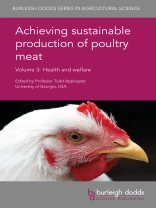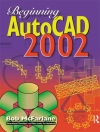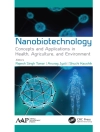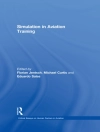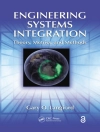- Reviews latest research on bacterial and viral diseases affecting poultry as well as other threats such as parasites;
- Discusses current research on disease management such as competitive exclusion treatments and other methods to boost immune function;
- Summarises advances in understanding poultry behaviour and improving flock welfare
สารบัญ
Part 1 Animal health
1.Monitoring trends in diseases of poultry: Brian Jordan, University of Georgia, USA
2.Gut health and susceptibility to enteric bacterial diseases in poultry: B. M. Hargis and G. Tellez, University of Arkansas, USA; and L. R. Bielke, Ohio State University, USA
3.Viruses affecting poultry: Venugopal Nair, Pirbright Institute, UK
4.Parasites affecting poultry: Larry Mc Dougald, University of Georgia, USA
5.Disease management of poultry flocks: Peter Groves, University of Sydney, Australia
6.Understanding and boosting poultry immune systems: Rami A. Dalloul, Avian Immunobiology Laboratory, Department of Animal and Poultry Sciences, Virginia Tech, USA
7.Competitive exclusion (CE) treatment to control pathogens in poultry: Carita Schneitz, Finland; and Martin Wierup, Swedish University of Agricultural Sciences (SLU), Sweden
8.Leg disorders in poultry: bacterial chondronecrosis with osteomyelitis (BCO): Robert F. Wideman, Jr., University of Arkansas, USA
Part 2 Animal welfare
9.Understanding poultry behaviour: M. M. Makagon and R. A. Blatchford, University of California-Davis, USA
10.Ensuring the welfare of broilers: an overview: T. B. Rodenburg, Wageningen University, The Netherlands
11.Broiler breeding flocks: management and animal welfare: Ingrid C. de Jong and Rick A. van Emous, Wageningen Livestock Research, The Netherlands
12.The effect on incubation temperature on embryonic development in poultry: M. S. Lilburn and R. Shanmugasundaram, Ohio State University, USA
13.The contribution of environmental enrichment to sustainable poultry production: Inma Estevez, Neiker-Tecnalia and Ikerbasque ( The Basque Foundation for Science), Spain; and Ruth C. Newberry, Norwegian University of Life Sciences, Norway
14.Hot weather management of poultry: Brian Fairchild, University of Georgia, USA
15.Transportation and the welfare of poultry: K. Schwean-Lardner and T. G. Crowe, University of Saskatchewan, Canada
16.Developments in humane slaughtering techniques for poultry: Andy Butterworth, University of Bristol, UK
เกี่ยวกับผู้แต่ง
Bas Rodenburg studied biology at Wageningen University and graduated in 1998. In 2003, he received his Ph D from that same university, focusing his research on feather pecking behaviour in laying hens and how that is related with other behavioural characteristics, such as the ability to cope with fear and stress. After obtaining his Ph D, he worked at Livestock Research in Lelystad and at the ILVO in Ghent, Belgium, focusing on research in the area of poultry behaviour and welfare. In 2006, he returned to Wageningen on a personal VENI-grant to investigate the effects of genetic selection and of early-life environment on behaviour of group-housed laying hens. He was recently project leader of a research program aiming to translate scientific knowledge on feather pecking to commercial practice.
